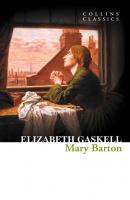Mary Barton. Элизабет Гаскелл
Чтение книги онлайн.

Читать онлайн книгу Mary Barton - Элизабет Гаскелл страница 11
Название: Mary Barton
Автор: Элизабет Гаскелл
Издательство: HarperCollins
Жанр: Классическая проза
isbn: 9780007480548
isbn:
He never wur clemmed,
An’ he ne’er picked ower i’ his loife.*
III
We tow’rt on six week – thinking aitch day wur th’ last,
We shifted, an’ shifted, till neaw we’re quoite fast;
We lived upo’ nettles, whoile nettles wur good,
An’ Waterloo porridge the best o’ eawr food,
Oi’m tellin’ yo’ true,
Oi can find folk enow,
As wur livin’ na better nor me.
IV
Owd Billy o’ Dans sent th’ baileys one day,
Fur a shop deebt oi eawd him, as oi could na pay,
But he wur too lat, fur owd Billy o’ th’ Bent
Had sowd th’ tit an’ cart, an’ ta’en goods for th’ rent,
We’d neawt left bo’ tho’ owd stoo’,
That wur seeats fur two,
An’ on it ceawred Marget an’ me.
V
Then t’ baileys leuked reawnd as sloy as a meawse,
When they seed as aw t’ goods were ta’en eawt o’ t’ heawse,
Says one chap to th’ tother, ‘Aws gone, theaw may see’;
Says oi, ‘Ne’er freet, mon, yeaur welcome ta’ me.’
They made no moor ado,
But whopped up th’ eawd stoo’,
An’ we booath leet, whack – upo’ t’ flags!
VI
Then oi said to eawr Marget, as we lay upo’ t’ floor,
‘We’s never be lower i’ this warld, oi’m sure,
If ever things awtern, oi’m sure they mun mend,
For oi think i’ my heart we’re booath at t’ far eend;
For meeat we ha’ none,
Nor looms t’ weyve on, –
Edad! they’re as good lost as fund.’
VII
Eawr Marget declares, had hoo clooas to put on,
Hoo’d goo up to Lunnon an’ talk to th’ greet mon;
An’ if things were na awtered when there hoo had been,
Hoo’s fully resolved t’ sew up meawth an’ eend;
Hoo’s neawt to say again t’ king,
But hoo loikes a fair thing,
An’ hoo says hoo can tell when hoo’s hurt.
The air to which this is sung is a kind of droning recitative, depending much on expression and feeling. To read it, it may, perhaps, seem humorous; but it is that humour which is near akin to pathos, and to those who have seen the distress it describes it is a powerfully pathetic song. Margaret had both witnessed the destitution, and had the heart to feel it, and withal, her voice was of that rich and rare order, which does not require any great compass of notes to make itself appreciated. Alice had her quiet enjoyment of tears. But Margaret, with fixed eye, and earnest, dreamy look, seemed to become more and more absorbed in realising to herself the woe she had been describing, and which she felt might at that very moment be suffering and hopeless within a short distance of their comparative comfort.
Suddenly she burst forth with all the power of her magnificent voice, as if a prayer from her very heart for all who were in distress, in the grand supplication, ‘Lord, remember David.’ Mary held her breath, unwilling to lose a note, it was so clear, so perfect, so imploring. A far more correct musician than Mary might have paused with equal admiration of the really scientific knowledge with which the poor depressed-looking young needlewoman used her superb and flexile voice. Deborah Travers herself (once an Oldham factory girl, and afterwards the darling of fashionable crowds as Mrs Knyvett) might have owned a sister in her art.
She stopped; and with tears of holy sympathy in her eyes, Alice thanked the songstress, who resumed her calm, demure manner, much to Mary’s wonder, for she looked at her unweariedly, as if surprised that the hidden power should not be perceived in the outward appearance.
When Alice’s little speech of thanks was over, there was quiet enough to hear a fine, though rather quavering, male voice, going over again one or two strains of Margaret’s song.
‘That’s grandfather!’ exclaimed she. ‘I must be going, for he said he should not be at home till past nine.’
‘Well, I’ll not say nay, for I have to be up by four for a very heavy wash at Mrs Simpson’s; but I shall be terrible glad to see you again at any time, lasses; and I hope you’ll take to one another.’
As the girls ran up the cellar steps together, Margaret said: ‘Just step in, and see grandfather, I should like him to see you.’
And Mary consented.
* ‘Liefer’, rather. A.S. leof, dear. ‘There n’is no thing, sauf bred, that me were lever.’ – CHAUCER, Monk’s Tale.
* ‘Come to me, Tyrrel, soon, at after supper.’ – SHAKESPEARE, Richard III.
* ‘Frabbit’, peevish.
* ‘Clem’, to starve with hunger. ‘Hard is the choice, when the valiant must eat their arms or clem.’ – BEN JONSON.
* To ‘pick ower’ means to throw the shuttle in hand-loom weaving.
The Mill on Fire – Jem Wilson to the Rescue
‘Learned he was; nor bird, nor insect flew,
But he its leafy home and history knew:
Nor wild-flower decked the СКАЧАТЬ